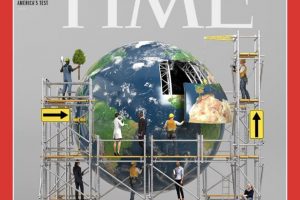In the financial life of every culture built upon faulty monetary policy, there are points at which the thin thread of economic faith; the thread that ties the entire failing system together, the thread made tangible by the hopes (and sometimes ignorance) of the general populace, finally snaps. From Ancient Rome, to Weimar Germany, to Argentina, to modern day America, no society fueled by unsustainable debt and fiat inflation can duck the ‘Fiscal Reaper’ for very long. The U.S. alone has survived since the early 1970’s (after Nixon removed the last vestiges of the gold standard) on nothing but questionable credit practices and baseless optimism, but there is a limit to the power of fantasy. This is a fact that most mainstream financial analysts and some in the American public refuse to grasp. Mere belief in the enduring nature of the marketplace is not enough; the fundamentals must also support that belief.
Today, we face an atmosphere in which the fundamentals are fiercely opposed to the publicly promoted perception of the economy, and it is moments in history like this that present a clear primer for total collapse. Financial disaster is bad enough when it is at least partially anticipated. When the masses are caught completely unaware and unprepared in the midst of misguided conviction, this leads to the worst kind of tragedy: the ironic and Shakespearian kind. To avoid this brand of tragedy is one of the primary reasons why we in the Liberty Movement do what we do. We may not be able to stop the current crisis from developing, but we can create awareness, and through this we can lessen the cultural shock, and thereby lessen the impact.
Mainstream economists crowed about the “invincible” rise of globalism and the unstoppable U.S. financial juggernaut for years while more level headed and intelligent men tried to warn the public of danger. The initial derivatives collapse in 2007 / 2008 should have put all of these pathetic establishment cheerleaders to shame, not to mention out of work. Yet three years later, amazingly, we are asked, even expected, to continue to look to such sad and useless people for predictions on market stability that always turn out absolutely inaccurate, and advice on savings and investment that they are not equipped to give.
I suppose we should not be surprised by the continued lifespan of MSM parrots and puppets. They may not be helpful to the average American, but they are very helpful to international banks and the globalist companies that pay their salaries. They distract and confuse us. They comfort when they should caution, and contradict when they should pay heed. Our financial house is burning from the bottom floor up, and they assure us that the warm orange glow is just the dawning of a new and beautiful day. We are told to “look to the future”, a return to normalcy is “just around the corner”. Never would they dare to weigh the cold hard factors of the present, or the ruse would be up. Whether they are aware of it or not the lies media pundits perpetuate set the stage for even greater upheaval, to the detriment of most, and the benefit of only a handful.
In this article, as we have in so many others, we will examine those lies, as well as the truths they are meant to hide. The most important truth of all being, that not only are we not in the middle of a recovery, but that the final phase of the economic meltdown is about to commence…
Distractions, Half-Truths, And Outright Lies
“We will not have any more crashes in our time.”
– John Maynard Keynes in 1927
“I see nothing in the present situation that is either menacing or warrants pessimism… I have every confidence that there will be a revival of activity in the spring, and that during this coming year the country will make steady progress.”
– Andrew W. Mellon, U.S. Secretary of the Treasury December 31, 1929
“[1930 will be] a splendid employment year.”
– U.S. Dept. of Labor, New Year’s Forecast, December 1929
“While the crash only took place six months ago, I am convinced we have now passed through the worst — and with continued unity of effort we shall rapidly recover. There has been no significant bank or industrial failure. That danger, too, is safely behind us.”
– Herbert Hoover, President of the United States, May 1, 1930
Most of us were not alive to witness the throws of the Great Depression, but for many, the quotes above sound strangely familiar. Pundits and government officials of our fateful era have taken to spewing the same kind of nonsense on a daily basis, and one begins to wonder if they are TRYING to top the ridiculous statements of their forebears in an attempt of ultimate mockery. Today, not only are we told that “green shoots” abound, but that if those green shoots fail, it will only be because we did not “believe” hard enough in their existence!
It is this kind of idiocy that led us to the state of affairs we are in now, and it is the same idiocy that will leave millions of Americans in extended financial ruin in the near future. The absurd idea that prosperity is driven merely by blind optimism must be put to rest if we are ever to rebuild. Transparency, the pure and unadulterated truth, must be present in every aspect of government and finance without question for a culture to succeed. No longer can we operate in a system built upon the premise that the American people must be kept in the dark “for their own good”.
The essence of the recovery argument lay in unsubstantiated rhetoric, skewed statistics, and the over-promotion of news items that in reality are very minor economic indicators. Wall street reform has been heralded as a fix-all, yet the language of the legislation does little to nothing in reigning in the toxic derivatives trading practices that fomented the housing bubble, nor does it take any measures against the root cause of the mortgage crisis; the private Federal Reserve Bank, which artificially lowered interest rates and lending standards during the 1990’s knowing full well that this would amass pockets of poisonous debt securities throughout the economy. International banks have not been truly punished for their practices of market rigging and faulty accounting, nor will they be. The recent and laughable lawsuit settlements of AIG and Goldman Sachs prove that no bankers will be held accountable, only penalized with fines that amount to little more than pocket change to these monstrous global corporations:
http://www.sec.gov/news/press/2010/2010-123.htm
http://www.cbsnews.com/stories/2010/07/16/ap/business/main6685538.shtml
This means that the conditions which triggered the initial collapse have not been mended in any way. Absolutely nothing has changed since 2007. Americans have only been temporarily shielded from the effects and the particulars of continuing financial corruption. For instance, it has been revealed that the SEC itself has known since at least April that Citigroup has been hiding assets and debts on its books by counting Repurchase Agreements as actual sales. For those of you not familiar with such slight-of-hand, this is the same kind of accounting trick that led to the fall of Lehman Brothers:
http://www.reuters.com/article/idUSTRE66F0NV20100716
Citigroup claims, of course, that these Repurchase Agreements are only a small part of their operation and will not affect their ability to function. The problem is that like Lehman Brothers and Citigroup, it is probable that most global banks have used false accounting procedures to hide the true measure of their leveraged capital. It certainly is not in their best interest to reveal the whole truth, so why would they? Due to the continuing dilemma of hidden and unreported bank debts, it is only a matter of time before we witness yet another credit implosion, followed by even more taxpayer funded bailouts, and even greater stress on the stability of the U.S. Dollar.
While empty promises of reform and the hidden accounting practices of banks have kept markets malleable for the moment, it is really the exaggeration of consumer spending and retail gains, along with rigged unemployment reports from the Labor Department, that have kept the false recovery wheel spinning for over a year. Any profit or production increase by almost any company has been held up as a rallying cry for a bull market, even though in most cases these companies increased profits by cutting their labor force, and increased production by forcing their remaining employees to work harder for the same amount of money. They did not expand profits because the U.S. consumer is spending once again with wild abandon as has been suggested every time new quarterly profit reports are released. After a year of this misrepresentation of the facts, finally, the truth is starting to come out.
Retail stocks are beginning to shed value as they take hits from decreasing sales and profits, meaning, the cost cutting strategy has run its course and retailers are still losing money:
http://www.bloomberg.com/news/2010-07-14/sales-at-u-s-retailers-fell-for-a-second-month-in-june.html
Service sector employment has remained stagnant. The excitable talk that started at the beginning of this year of a hiring resurgence has now faded:
http://www.reuters.com/article/idUSTRE65M2WK20100706
The bottom line; the TRUE unemployment rate of around 20% has become perpetual, and some economists are even suggesting that we accept it as a standard. The American public is now coming to realize that healthy job creation is a very distant goal, one that the government alone has no ability to achieve, bailout or no bailout:
On the international scene, news from Europe has gone abruptly quiet. After months of blaring reports on the Greek sovereign debt crisis, and the imploding Euro, suddenly, we are told that the situation is stabilized? But how? What measures were taken and how did they affect a balancing of the EU economy? The fact is, no measures have been taken. No effective adjustments have been made. The MSM has only muted the reports, and for many Americans, out-of-sight truly is out-of-mind.
Greece is still right where it was six months ago, and the debt to GDP ratios of EU member countries continue to rise.
The mere mention that Spain’s Aaa credit rating was coming under review for a possible downgrade jolted stocks at the beginning of July. The review is not set to conclude for three months, but the market reaction shows that some of the larger investment firms are keenly aware of the weakness in Spain, and the chance that it will become the next in a long line of Greek style implosions:
Portugal’s credit rating was downgraded by Fitch in March, and now it has been downgraded by Moody’s as well:
http://www.huffingtonpost.com/2010/07/13/portugals-credit-rating-d_n_644093.html
And, the IMF and the EU have suspended a review of Hungary’s funding program while the country is in the midst of meltdown. This means Hungary will no longer have access to the $25.1 billion loan package made available by the IMF to see them through the crisis. Frankly, I think all countries are much better off not taking money from the demon spawn over at the IMF, but many of the citizens of Hungary may not see it that way. The suspension of the loan package almost ensures a national default:
http://www.reuters.com/article/idUSTRE66G0RT20100717
Most European countries are in the same predicament as Greece to varying degrees, Greece just happened to be the first to fall. The combined weight of sovereign debts in all EU countries is now threatening the very framework of the European Central Bank itself. The ECB is now facing higher interest rates, which means increased funding costs that they cannot afford without inflating the Euro:
What is this leading to? A situation we have been warning about for years; either the default of numerous EU member nations, or the inflationary collapse of the Euro. In each case, the EU will eventually be forced to turn towards the only avenue left available to them; the IMF and full austerity measures. This, of course, was the plan all along….
We have just covered the broader problems in the world economy that have been obscured by the establishment media in order to perpetuate a false sense of security in the masses. However, these are simply ongoing problems that some may dismiss as “par for the course”, troubles that could go on for years without causing immediate damage to America itself. Other recent events, though, now show that the likelihood of a final phase meltdown of the U.S. economy may begin before the end of this year.
The Signs Of Final Phase Collapse
It is difficult to write about economic indicators of collapse for many reasons, but the primary issue is one of relativity. Most Americans alive today have never suffered through an extended depression and few if any have ever witnessed a full fledged meltdown of a country’s finance and infrastructure. Therefore, many people in this country have no point of reference with which to compare and contrast the events of the new millennium. The unfortunate reality is, when a society enjoys an extended period of affluence, they often become conditioned to take prosperity for granted. They become unable or unwilling to interpret warning signs of a collapse until the event is already near its end, and they have lost everything.
The signals listed below I believe are truly the last straw, the final alarm before the global financial system spirals completely out of control. It is impossible to say exactly when this larger secondary breakdown will occur, however, when one studies the economic disasters of the past, these same primers tend to appear preceding very fast moving financial decay.
Secondary Real Estate Bubble: If you think you’ve seen a catastrophe in the real estate market so far, just wait another six months. Now that the government home buyer tax credit has ended, we are starting to see how much the real estate market really was being propped up by taxpayer dollars. Mortgage bond yields have plummeted to their lowest level on record while bond sales have slumped, all in anticipation of another massive round of mortgage defaults:
Sales of new U.S. homes have plunged to the lowest level on record:
And, nearly 1 in 3 homes sales in the first quarter of 2010 were foreclosures at rock bottom prices:
http://news.yahoo.com/s/nm/20100630/us_nm/us_usa_housing_foreclosures
Home foreclosures are on track to reach 1 Million or more by the end of 2010, and home seizures have risen 38% as banks process a backlog of mortgage defaults. This is despite efforts by banks to reduce foreclosure numbers by modifying loans and attempting short sales of properties:
http://news.yahoo.com/s/ap/20100715/ap_on_bi_ge/us_foreclosure_rates
This is nothing compared to the nightmare that is brewing in the commercial real estate market. Commercial real estate transactions have collapsed by 90% as many people are aware:
However, most analysts tend to overlook retail land occupancy rates. Commercial property vacancies have hit a ten year high:
http://www.reuters.com/article/idUSN0610302020100707
In the past, owners of commercial real estate have enjoyed extra credit and loan extensions from banks because financiers hope that by supporting the commercial market through the downturn they might retrieve profits once the economic uncertainty has ended and businesses start making money again. But what happens when the downturn does not end? Banks are only going to extend loans for so long before they pull the plug, even on commercial borrowers. It would seem that the time has come for the commercial real estate bubble to finally burst.
Why are these recent problems in the real estate market an indicator of a final phase collapse in the near term? The issue is one of prolonged instability. The recession / depression that we face today should have transpired sometime in the early 1990’s. But the engineered low interest rates supplied buy the private Federal Reserve during that decade created the property value boom. Any American could buy a home regardless of whether or not they could actually afford it, and anyone with a home could then use it as collateral for enormous credit lines. This new artificial debt bubble prolonged the collapse for around fifteen years. As of the second quarter of 2010, though, this credit source has been exhausted completely. There is officially nothing left to support the general economy (except, of course, fiat inflation). The effects of this lack of national capital should become very visible by the end of this year.
Unemployment Visibility: It did not come as a surprise to this researcher that the jobs market began to crumble once again in June and July, but it did come as a surprise to some. We’ve talked on numerous occasions about how the Labor Department hides the true level of unemployment from the public, and I won’t beat that poor dead horse any further. Suffice to say, real unemployment counting the U6 measurement is around 20%. The length of the average American’s unemployment has reached incredible levels. Many millions have remained jobless for 6 to 12 months. In response, the Federal Government has extended unemployment benefits several times over the past year. While this has been painted as a necessary action to save the livelihood of jobless citizens, it is less about “compassion” from the government and more about obscuring the effects of unemployment until they are ready to let the cradle fall. That time has come.
Congress has not renewed extensions of benefits as of this month, and it looks as though they do not plan to do so again. Barack Obama (or his handlers) have tried to turn this issue into another false left / right paradigm argument, claiming that it is the Republicans that are to blame for the loss of unemployment benefits. This is a distraction from the real matter at hand. The truth is, the ENTIRE government is responsible for the disruption of benefits due to the unchecked and insane deficit spending BOTH parties have enacted over the years. Extending benefits again would add billions if not trillions to the already unsustainable U.S. debt and cannot be continued indefinitely.
Unemployment benefits hide the visible scars of national job loss. Now that millions of Americans have run out, expect to see those scars in all their terrible glory. Expect homeless numbers to skyrocket. Expect crime to skyrocket. Expect suicides to skyrocket. Expect all the problems that were once muted and hidden to now parade across the street where you live. Expect things to deteriorate from the comparably nice, polite, and civil situation we have currently. Expect things to get ugly.
Municipal Debt Implosion: As we have been warning about for the past couple years, municipal bonds are in dire straights. Cities and some states are ready to implode and they are ready to implode now. Look for city defaults to rise to record levels in the next year.
California and Illinois are broke, make no mistake. When Arnold calls for state employee pay to be reduced to minimum wage and Illinois lets $5 Billion in bills go unpaid, there is no turning back:
Municipal Bond Defaults now continue at triple the typical rate:
This not only sets the stage for statewide bankruptcies, it also threatens to bring down large holders of municipal securities, such as Citigroup and U.S. Bancorp:
Usually, muni-bonds are used by investors as a tax haven and hedge to weather credit storms like that which we are seeing now, yet, investors in the past few months have begun dumping their municipals like a bad date. I believe we will begin hearing about state defaults before the end of the year.
The Dollar? Stick A Fork In It, It’s Done: As we recently predicted, the dollar has broken its traditional relationship with the stock market. Usually, when investors pull their money out of stocks, they then place it in dollar based securities as a safe haven. This causes the dollar to increase in value. In the past few weeks, though, the dollar has plummeted at the same time as stocks! This means investors no longer trust the dollar as a safe haven investment during a market crisis. As we have said for years, when this signal happens, the dollar is ripe for meltdown.
Central banks across the world are beginning to abandon the U.S. dollar:
http://wallstreet.blogs.fortune.cnn.com/2010/07/09/central-banks-start-to-abandon-the-u-s-dollar/
Despite the uncertainty in Europe, the dollar has still sunk against the Euro faster than it has in the past year:
In 2008, I predicted that China would radically re-engineer its economy, changing it from an export based hub to a self sustaining consumer hub. I predicted that they would depeg the Yuan from the Dollar after this move was done, and following that, they would dump their vast holdings of U.S. treasuries, causing the dollar to lose its world reserve status, destroying its value, and creating hyperinflation in prices here in the U.S. So far, the first two events have already occurred. China has depegged its currency from the dollar and is allowing it to begin appreciating. They have also almost finished converting their economy into a consumer system while continuing exports through the ASEAN trading bloc:
http://www.nytimes.com/2010/06/25/world/asia/25china.html?_r=1&ref=global-home
The Yuan is now being globalized by the Chinese in an effort to strengthen its base and make it viable as a reserve currency:
http://www.reuters.com/article/idUSTRE66427920100705
Some analysts have suggested that the globalization of the Yuan could take years, however, this is not necessarily so. If the U.S. dollar were to collapse, or the Euro, or both, the Yuan suddenly would look extremely viable as a reserve currency. I believe this is exactly what will happen, and, I believe China will begin depleting its U.S. Treasury holdings in the next 6 months.
Interestingly, some in China have gone out of their way to deny that such plans are in the wings, and the MSM has helped to facilitate this fallacy:
http://www.reuters.com/article/idUSTRE6660VC20100707
Set aside the fact that others in China are calling for the government to dump U.S. Treasuries:
http://www.reuters.com/article/idUSTRE66I05U20100719
Now would be the perfect time considering the dollar’s recent rise due to the problems in the EU. A bond dump at this time would mean China could reap maximum profits before a final monetary breakdown. China is reverting to a consumer hub and is no longer relying on exports to the U.S., so the idea that they have any reason whatsoever to continue holding onto U.S. Treasuries is absurd.
The final key to the coming Chinese treasury dump, I feel, is in the relationship between China and Germany. Germany is really the primary pillar of the EU, without it, the EU could not exist. A barely publicized visit by German Chancellor Angela Merkel on July 15th may be the final piece of a long escalating financial relationship between China and the stronger countries of the EU:
http://news.xinhuanet.com/english2010/china/2010-07/14/c_111953600.htm
A Chinese / German financial alliance could create a core economic “shell” which might withstand an anticipated disintegration in the U.S. and some of the more indebted European nations. I do not expect the dollar as we know it to survive past 2011.
The Line Has Been Crossed
I have never seen so many indicators of total meltdown, when compared to past economic collapses throughout history, as I see today. Not to sound melodramatic, but I’m really not certain if I will be writing these financial analysis articles for much longer. I suspect that before the year is out there will be no more need, being that every facet I have laid out over the years will become glaringly obvious to everyone.
As I have stated so many times, we may not be able to stop these events from unfolding, but we can determine there final outcome. Prepare for the worst, because I have no doubt you are liable to see it before the next few years are done. Stand by your principles. Never compromise your conscience. And above all else, survive. No ending culminates without the graces of a new life, one full of possibility. It is up to you, the staunch and independent American individual, to see that that possibility is realized regardless of any obstacle or enemy. A fiscal catastrophe will not stop us, it will not break our spirits, it will not enslave us. It will only strengthen our resolve to remain forever defiant, and forever free.
Giordano Bruno
sursa: Neithercorp Press












Adauga comentariu